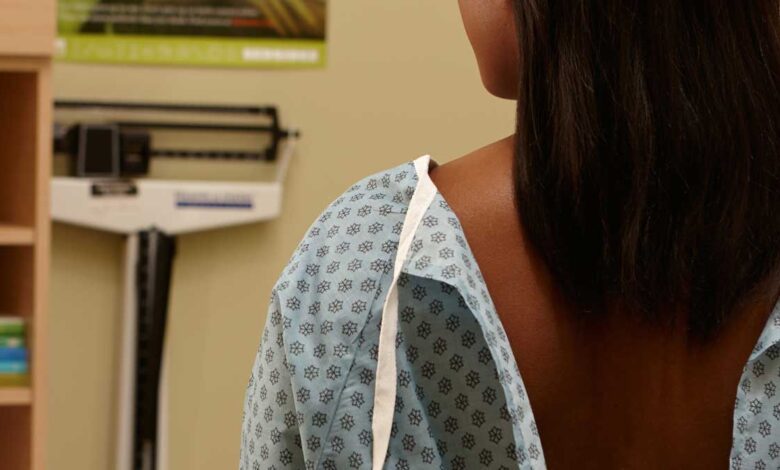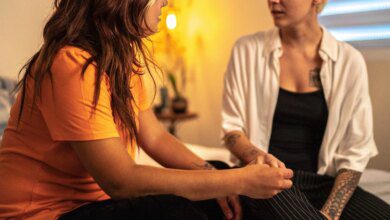Freaking out about monkeypox? Here’s what you need to know.

Since May of 2022 an increasing number of people worldwide have been diagnosed with monkeypox infection. In cases are increasing in the USmonkeypox was declared a public health emergency on August 4, 2022. Here’s what you need to know.
What is monkeypox?
Monkeypox is a virus that can spread from person to person. It is not a new virus (like COVID in 2019), but it is usually diagnosed in limited areas of the world. Researchers are not yet sure what caused the virus to spread and create outbreaks around the world.
How do I know if I have monkeypox?
Symptoms of monkeypox usually begin within three weeks of exposure to the virus (see below for more on how it spreads). The most common symptoms are fever, headache, swollen lymph nodes, fatigue, body aches, and chills, as well as cough, sore throat, and congestion.
The first flu-like symptoms usually follow one to four days after a rash, although some people develop a rash without first having a fever or other symptoms. The monkeypox rash is most likely on your face, arms, and legs, including the palms of your hands and soles of your feet, but it can be on other parts of your body, including your genitals. The rash progresses from small bumps to larger blisters filled with yellow fluid over five to seven days before crusting over, drying out, and being replaced by new skin.
The number and size of blisters can vary greatly between people, from just one or a few to covering the entire body and unfortunately, the rash can be itchy and quite painful. Although most monkeypox infections are mild and symptoms resolve on their own without treatment, it may take two to four weeks for the blisters to heal completely. In some cases, monkeypox can lead to complications and even death.
Can I have monkeypox?
There are three main ways we know now that monkeypox can get from person to person. The first way is if someone touches the blisters of a person with monkeypox or touches surfaces or objects contaminated with the monkeypox virus, such as clothing, blankets, or towels. It can also be transmitted through respiratory fluids from close face-to-face contact, such as through heavy breathing during sex, or during kissing, hugging, or close conversation. It is also possible for a pregnant woman to pass monkeypox through the placenta during pregnancy.
A person with monkeypox can pass the virus from the first time they experience symptoms until the blisters heal completely, which can take several weeks. It’s possible that the monkeypox virus causing the current outbreak has mutated to be more transmissible or airborne without close physical contact, but we don’t know that for sure yet.
Is monkeypox a sexually transmitted infection (STI)?
It is not yet known whether monkeypox is spread through semen, vaginal fluid, or blood. However, it is spread through close physical contact, which often involves sex. So monkeypox definitely passes between partners, but what’s not clear is whether it’s only through close contact, or whether semen or vaginal fluids also contribute to the transmission of monkeypox.
It’s important to remember that anyone exposed to the virus can get monkeypox, regardless of your age, what gender you have, who you have sex with, or what your gender identity is.
What can I do to prevent monkeypox?
The good news is that we now have a monkeypox vaccine available, but the bad news is that the supply is limited at the moment so not everyone can get the monkeypox vaccine. Priority for vaccination is given to people at highest riskincluding people who know they have been exposed to monkeypox and those who are more likely to be exposed.
Until we learn more about how monkeypox is transmitted (or not) during sex, the current recommendation is to use a condom or an internal condom if you have sex with someone who has had monkeypox for eight to 12 weeks after infection. We know that’s a big range, but scientists haven’t been able to narrow it down yet.
Because monkeypox can be transmitted from contaminated surfaces and objects, including clothing and sex toys, it’s important to make sure you immediately disinfects any object and place used or touched by a person with monkeypox.
What should I do if I think I have monkeypox?
Contact a health care provider and find out if they can test you for monkeypox. There are tests for monkeypox, but you will need to see a health care provider to be diagnosed. Now that monkeypox has been classified as a public health emergency, there is more funding to make testing more accessible.
There are currently no treatments specifically for monkeypox, however, treatments have been developed for smallpox, including anti-retroviral drugs, immune therapies, and post-exposure prophylaxis with a vaccine within three days to two weeks of exposure, can be effective.





